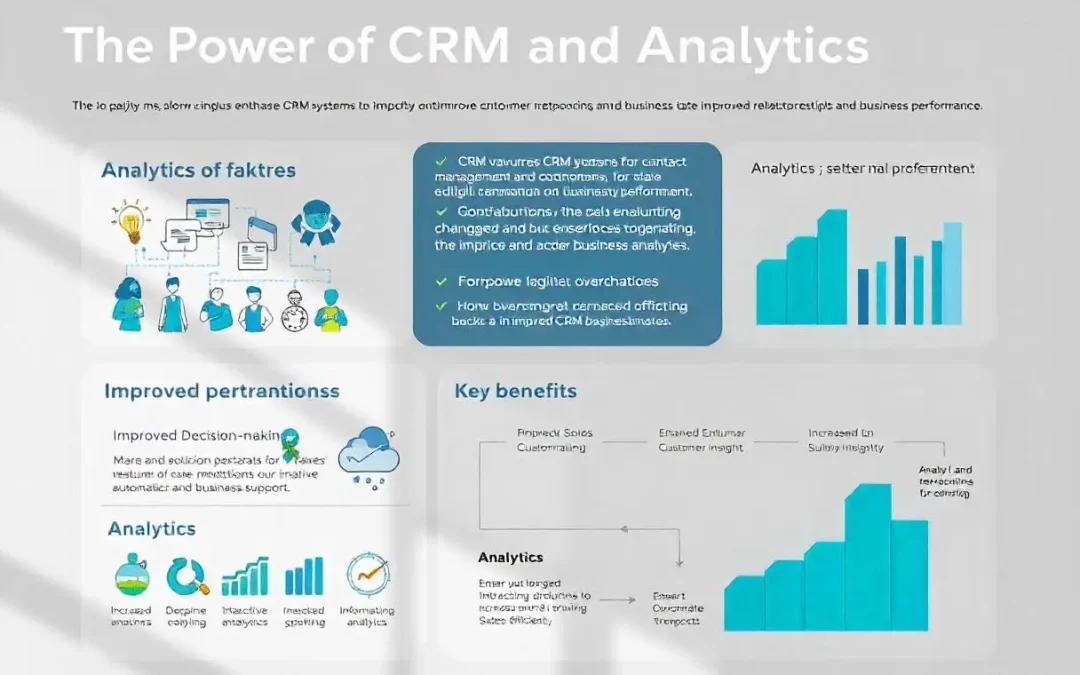In the rapidly evolving business landscape, effective management of customer relationships is more critical than ever. This brings us to the significance of CRM and analytics —two powerful tools that can help businesses harness data to improve customer experience, enhance sales strategies, and drive overall growth. In this comprehensive article, we will explore what CRM and analytics are, how they intertwine, and the benefits they offer to businesses looking to thrive in a competitive market.
Understanding CRM and Analytics
What is CRM?
Customer Relationship Management (CRM) refers to the practices, strategies, and technologies that companies use to manage and analyze customer interactions throughout the customer lifecycle. The primary goals of CRM are to improve business relationships, streamline processes, and increase profitability.
Key Features of CRM Systems
- Contact Management: Keep track of customer information and interactions.
- Sales Management: Manage leads, sales pipelines, and performance tracking.
- Customer Support: Provide tools for customer service teams to resolve issues efficiently.
- Marketing Automation: Automate marketing campaigns and monitor their effectiveness.
What is Analytics?
Analytics involves the systematic computational analysis of data to gain insights that inform business decisions. In the context of customer relationship management, analytics can reveal trends, identify opportunities, and drive strategic initiatives based on customer behavior.
Key Types of Analytics
- Descriptive Analytics: Focuses on understanding what has happened in the past.
- Predictive Analytics: Uses historical data to forecast future outcomes.
- Prescriptive Analytics: Recommends actions based on data analysis to achieve desired results.
The Integration of CRM and Analytics
Why Integrate CRM with Analytics?
Integrating CRM with analytics provides businesses with a comprehensive view of customer interactions, preferences, and behaviors. This integration allows for more informed decision-making, better-targeted marketing strategies, and improved customer service.
Benefits of Integration
- Enhanced Customer Insights: Analytics help decipher customer data from CRM, revealing deeper insights into buying patterns and preferences.
- Improved Targeting: Companies can create more personalized marketing campaigns based on data-driven insights.
- Increased Efficiency: Integration streamlines processes by combining customer data with analytics tools, enabling better response times and communication.
How CRM and Analytics Improve Business Performance
1. Enhanced Customer Experience
Understanding customer needs and preferences through analytics allows businesses to tailor their offerings and communications effectively.
Key Actions:
- Personalized Interactions: Use customer data to personalize marketing messages and offers.
- Proactive Support: Analyze customer interactions to predict issues and address them before they escalate.
2. Data-Driven Decision Making
Analytics equips businesses with the knowledge to make informed decisions regarding operations, marketing, and sales strategies.
Key Actions:
- Performance Tracking: Regularly analyze sales data to understand which strategies are most effective.
- Market Trends Analysis: Use analytics to identify emerging trends and adjust strategies accordingly.
3. Increased Sales and Revenue
By leveraging CRM and analytics, businesses can improve lead generation, conversion rates, and customer retention.
Key Actions:
- Lead Scoring: Implement analytics to prioritize leads based on their likelihood to convert.
- Customer Retention Strategies: Analyze churn data to develop strategies for retaining at-risk customers.
Choosing the Right CRM and Analytics Tools
Factors to Consider
When selecting CRM and analytics tools, consider the following factors:
- User-Friendliness: Look for tools that offer intuitive interfaces to ensure ease of use for your team.
- Integration Capabilities: Choose systems that can integrate easily with existing tools and platforms.
- Scalability: Ensure that the solutions can grow with your business needs.
- Data Security: Prioritize tools that provide robust security measures to protect sensitive customer data.
Popular CRM and Analytics Tools
- Salesforce: A leading CRM platform with powerful analytics capabilities.
- HubSpot CRM: Offers integrated analytics for tracking customer interactions and marketing effectiveness.
- Zoho CRM: Features customizable analytics dashboards for sales and customer insights.
- Microsoft Dynamics 365: Combines CRM with extensive analytical tools for comprehensive business insights.
Best Practices for Implementing CRM and Analytics
1. Define Clear Objectives
Establish clear goals for what you want to achieve with CRM and analytics. This could include improving customer satisfaction, increasing sales, or enhancing marketing campaigns.
2. Train Your Team
Invest in training for your team to ensure they understand how to use the tools effectively and can extract valuable insights from the data.
3. Monitor and Adjust
Regularly review the performance of your CRM and analytics strategies. Use the insights gathered to make necessary adjustments and improvements.
4. Encourage Data-Driven Culture
Foster a culture within your organization that values data-driven decision-making. Encourage employees to rely on analytics to inform their strategies and actions.
Conclusion
The integration of CRM and analytics is vital for businesses looking to strengthen customer relationships and drive growth. By leveraging data insights, companies can enhance customer experiences, make informed decisions, and ultimately increase sales. Choosing the right tools and implementing effective practices will set your business on the path to success.
Call to Action
Are you ready to transform your business with CRM and analytics? Share your thoughts and questions in the comments below, and explore additional articles on our website for more insights on improving your business strategies!
Closing Thoughts
Thank you for taking the time to read our comprehensive guide on CRM and analytics. We hope this article has provided valuable insights and inspires you to take action in optimizing your customer relationship management practices. We look forward to providing you with more informative content in the future!


